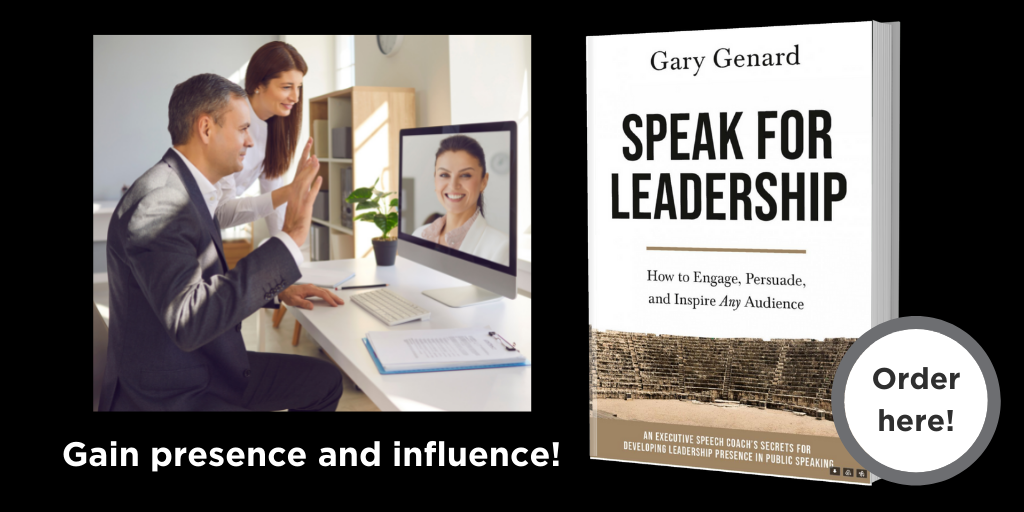Are you too busy putting together content to prepare the right way for public speaking? Here's the best way to prepare and practice a presentation
Time to step inside the Way Back Machine. Let's set the dial to a modest four years. At that time, I posted a piece on the smart way to prepare your presentations. What I said was, don't start out by writing, that is, spending your time in the literary world. Begin by speaking.
The point I was making was that, once you know you're going to give a speech, you need to know how your message sounds to listeners. They aren't going to be reading your beautifully written and polished notes, after all.
Want to know more about commanding a stage and inspiring listeners? Get my new book about succeeding in-person and virtually, Speak for Leadership.
How to Prepare for More Memorable Speaking
What about the key area of preparation and practice for more memorable speaking? Here two factors are of particular importance: (1) having a positive mindset and (2) preparing the right way just before you go on. British theatrical voice coach Cicely Berry quotes a line from T.S. Eliot’s poem “Ash Wednesday” in this regard: ‘Teach us to care and not to care.’ “The ‘caring’ is the work done to prepare,” she says, “and the ‘not caring’ is letting it go.”1
If you can be this free and still stay focused, you will rock the house! Learn more in my Free cheat sheet, "Leadership Skills: 10 Focusing Techniques for Public Speaking."
In other words: do all the work necessary to understand your listeners and what you want to accomplish. Then let it go, trusting in the moment of performance to make it happen. Too many presenters never ‘let go.’ Instead, they continue to focus only on their content, often fretting about getting all their material in during the time allowed. The result is that they’re not thinking about the audience and what they need to do to get through to them!
The Power of the Words You Choose
If you want to become a more memorable speaker, don’t remain chained to the same old topics you always talk about in your practice sessions. Trying practicing with “heightened” material such as poetry, Shakespeare, or great historical speeches. You’ll gain an appreciation for the meaning and power of words, along with the rhythms of rich and evocative language.
Powerful words are vital to your opening! Learn more in my most requested cheat sheet, "How to Start a Speech - 12 Foolproof Ways to Grab Your Audience!"
For one thing, you’ll discover that part of the power of language is in the sounds of the words themselves. (Working with anything from Shakespeare will really make you aware of this effect.) Just as music reaches us in ways that are deeper than our conscious thoughts, so does effective language. Consider how interesting it might be for an audience if you ditched clichéd business phrases such as “bottom line,” “buckets,” and “leaving money on the table." What if you used descriptive words that are better at conveying the exact meaning of your thoughts?
For instance, let’s take those three phrases I used above as examples. “The bottom line is . . .” can become a rhetorical question (a great device, by the way, for breaking up a one-way talk and refreshing listeners’ interest): E.g., “So where does that leave us in terms of our choices at this point?” “Buckets” can easily become groups (or groupings) or “actions based on priority.” And if you’ve left money on the table, then you’ve obviously failed to follow-up, close, take advantage of an opening, act decisively, seize the moment, etc.
Vocal aspects, i.e., how you deliver the phrases, also has a part to play in memorable performances. If you sense in your practice sessions, for instance, that it’s all becoming stale and won’t work in front of an audience, remember this (also from Berry): Your voice will never be as good in practice as when you’ve completed and forgotten the exercises. Instead, at the moment of performance, you will use your voice with imagination.2 You will, that is, if you’re in the moment and intent on getting through to people rather than delivering information!
Here's a key resource you need for succeeding in these vocal skills: my Free Tips and Tricks Guide, "5 Ways to Improve Your Voice as a Professional."
For instance, it’s not unusual for one of my clients to say in a training session: “If I’m struggling like this now, how am I going to do well in front of an audience?” I usually reply: “Oh, you’re going to be much better in performance! It will be the real situation, in front of the actual audience. You’ll bring your best game. What we’re doing here is just a poor simulation.”
A Word About What to Do Just Before You Go On: This is an important moment that many speakers make more difficult for themselves. That’s because they get into the wrong mindset. How about you? Do you spend valuable about-to-go-on time concerning yourself with getting the information across just so?
Or are you focused where you need to be: on connecting with this audience? Learn how with my Free resource "Great Speaking? It's About Performance Over Content."
It is much more productive to use this time to get centered and to remind yourself of who you are about to speak to and what you want to achieve with them. To explain further, I’ll use a theatrical metaphor.
Imagine it’s opening night of a play and you're standing in the wings listening for the cue to make your entrance. Are you rehearsing your lines one last time? You’d better not be!
Do that and you just might freeze in front of hundreds of people, allowing the result you were trying to prevent to occur. As every actor understands, if you don't know your lines by now, you won't help yourself by frantically trying to recall them just before the curtain goes up. What you should be thinking about is what your character was doing a moment ago and where he or she is coming from, so you’re a real person walking onto the set, with a whole life behind the lines you’re about to say.
The public speaking situation is no different, because you either know the content by now or you don't. You should be asking yourself questions about the audience. Who are they, what are their needs concerning this presentation, and most important, how will you connect with them?
You won't lose one bit of the material at your command. Equally important, you'll be someone who is present for the audience. Isn't that more memorable than a speaker who appears to be anxious about delivering the content perfectly?
1 Cicely Berry, Voice and the Actor (New York: Collier, 1973), 19.
2 Ibid., 77.
The above article is excerpted from my new book, Speak for Leadership. Click here or below to learn more and to get your copy!
You should follow me on Twitter here.
Gary Genard is an actor, author, and expert in public speaking training and overcoming speaking fear. His company, Boston-based The Genard Method offers live 1:1 Zoom executive coaching and corporate group training worldwide. In 2022 for the ninth consecutive year, Gary has been ranked by Global Gurus as One of the World’s Top 30 Communication Professionals. He is the author of the Amazon Best-Seller How to Give a Speech. His second book, Fearless Speaking, was named in 2019 as "One of the 100 Best Confidence Books of All Time." His handbook for presenting in videoconferences, Speaking Virtually offers strategies and tools for developing virtual presence in online meetings. Contact Gary here.





